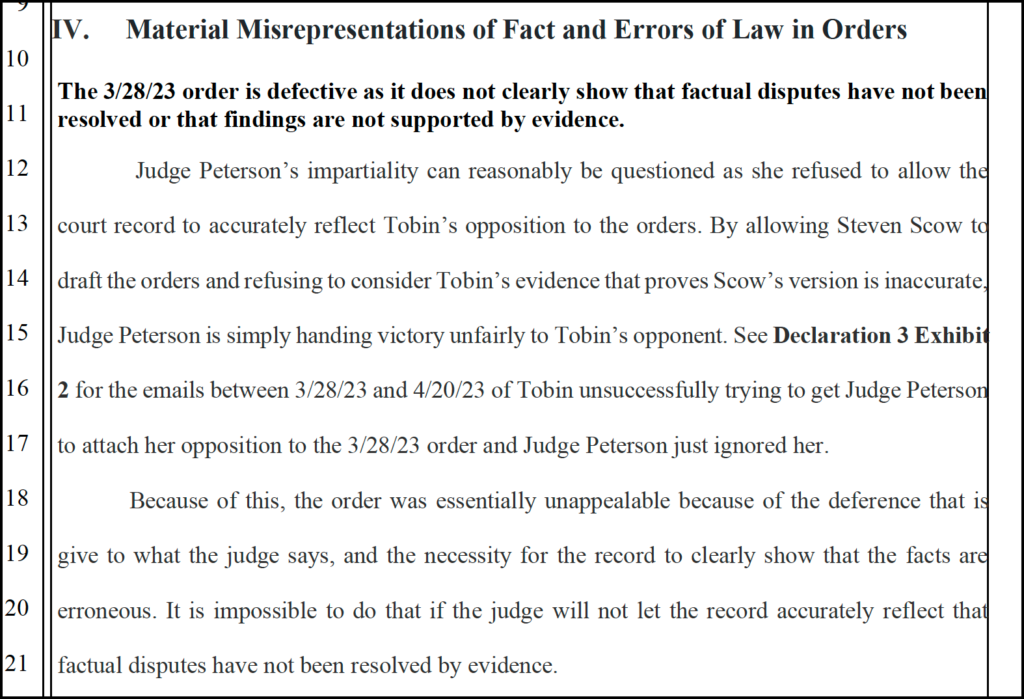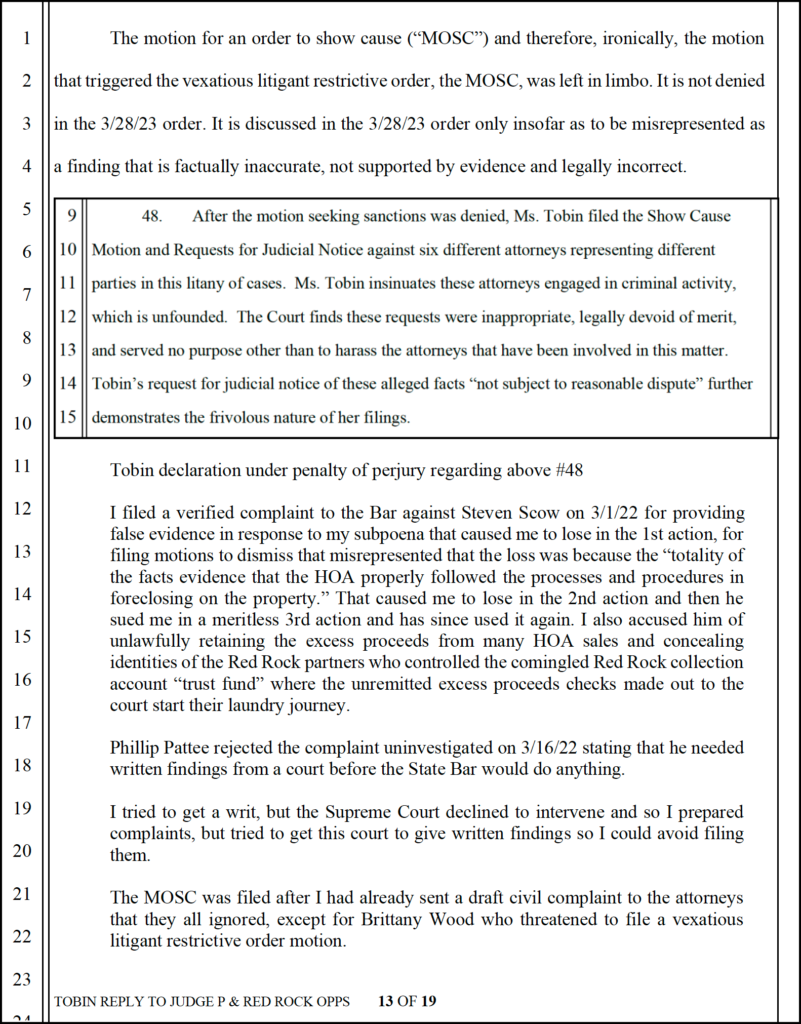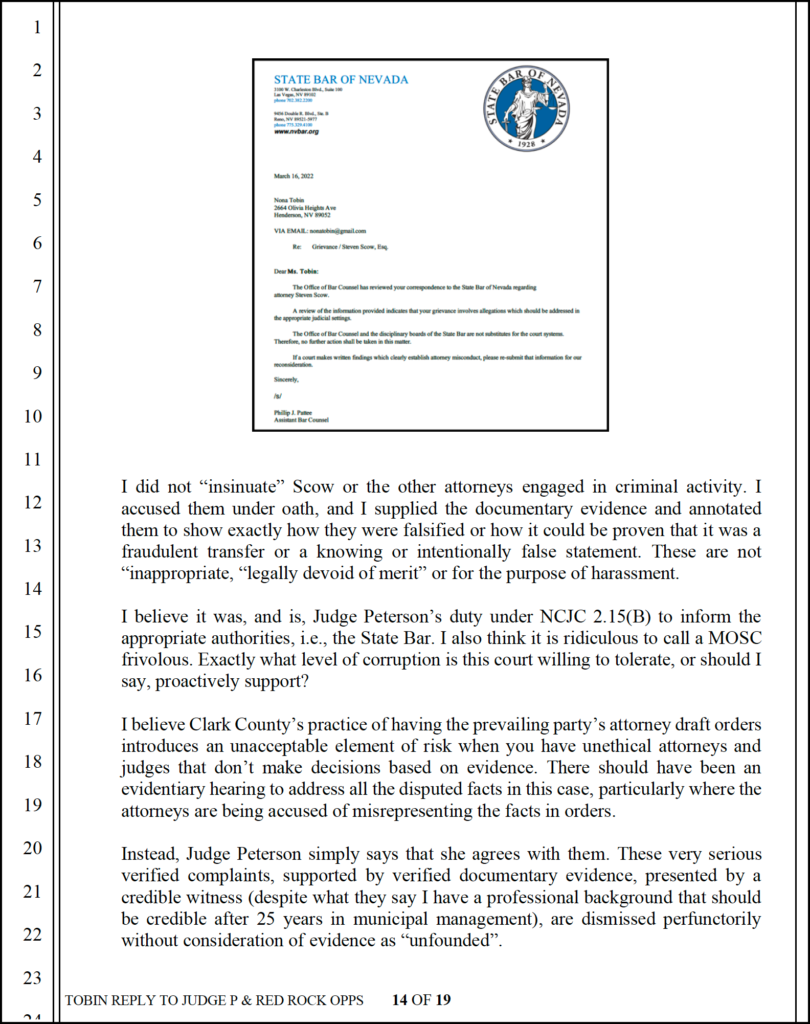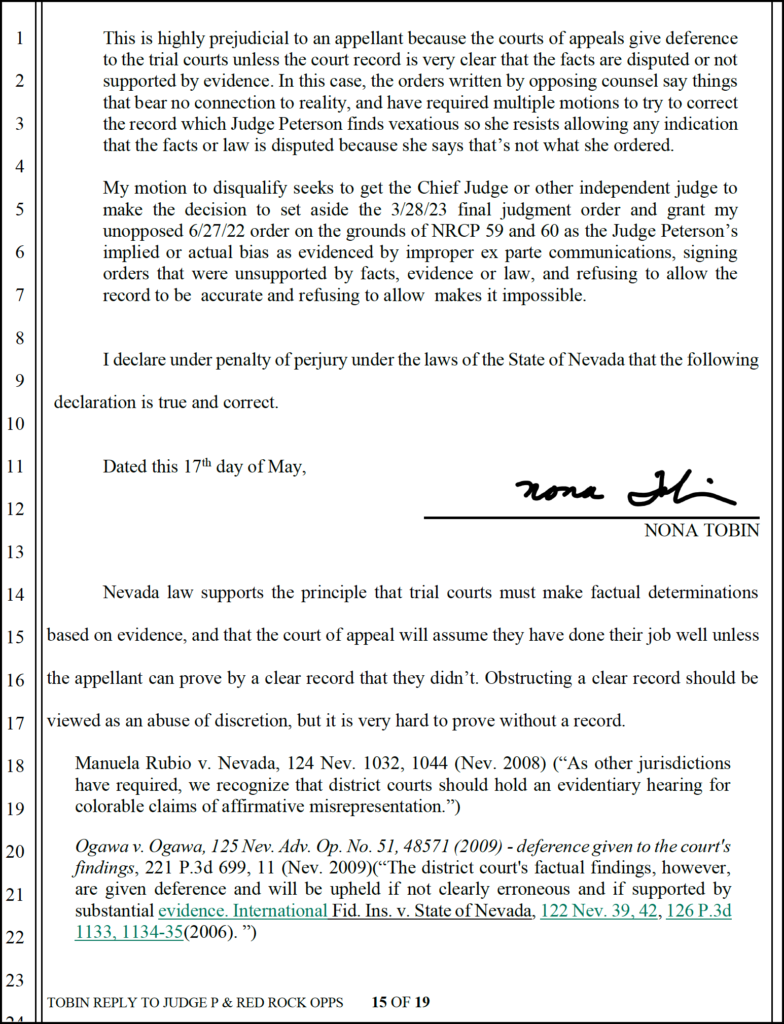In Nevada, the elements for a claim of quiet title are:
1. Action may be brought by any person against another who claims an estate or interest in real property, adverse to him, for the purpose of determining such adverse claims. NRS 40.010;2. Complaint must be verified. NRS 40.090-1;
3. Summons must be issued within one year of filing the complaint and served per NRCP. NRS 40.100-1;
4. Lis Pendens must be filed with the county recorder within 10 days of filing of the complaint. NRS 40.090-3;
5. Copy of the Summons must be posted on the property within 30 days after the summons is issued, and an affidavit of posting must be filed with the court. NRS 40.100-2;
6. Disclaimer must be filed. NRS 40.020;
7. Affidavit to unknown heirs must be filed. NRS 14.040(3);
8. Court must hold a hearing on the evidence in order to issue judgment.
9. Quiet title may not be obtained through default judgment. NRS
40.110; and
10. Record a certified copy of the judgment quieting title. NRS 247.120(0).
foyner v. Bank of America Home Loans. Case No. 2:09-CV-2406-RCJ-RJJ 2010 Breliant v. Preferred Equities Corp., 112 Nev. 663, 669, 918 P.2d 314, 318 (Nev.1996); Sceirine v. Densmore. 87 Nev. 9, 12,479 P.2d 779 (1971); MacDonald v. Krause. 77 Nev. 312, 317-18, 362 P.2d 724 (Nev.1961); Clay v. Scheeline Banking & Trust Co . 40 Nev. 9, 159 P. 1081, 1082-83 (1916) No. 2:09-CV-00567-RCJ-LRL, 2009 WL 5039495 (D. Nev. 2009); Del Webb Conservation Holding Corp. v. Tolman. 44 F. Supp. 2d 1105, 1109-10 (D. Nev 1999); Union Mill v. Mining Co. v. Warren, 82 F. 519, 520 (D. Nev. 1897); Howell v. Ricci, 197 P.3d 1044, 1046 n. 1 (Nev. 2008); Breliant v. Preferred Equities Corp., 112 Nev. 663, 669, 918 P.2d 314, 318 (Nev. 1996); Sceirine v. Densmore. 87 Nev. 9, 12,479 P.2d 779 (1971); MacDonald v. Krause. 77 Nev. 312, 317-18, 362 P.2d 724 (Nev.1961); Clay v. Scheeline Banking & Trust Co .. 40 Nev. 9, 159 P. 1081, 1082-83 (1916)
Jay Young, Nevada Law Blog
Nevada statutes on property disputes
NRS 40.010 Actions may be brought against adverse claimants.
An action may be brought by any person against another who claims an estate or interest in real property, adverse to the person bringing the action, for the purpose of determining such adverse claim.
NRS 40.010
NRS 40.020 Plaintiff not entitled to costs on default judgment or disclaimer.
If the defendant in such action disclaim in the defendant’s answer any interest or estate in the property, or suffer judgment to be taken against the defendant without answer, the plaintiff shall not recover costs.
NRS 40.020
NRS 40.050 Mortgage not deemed conveyance.
A mortgage of real property shall not be deemed a conveyance, whatever its terms, so as to enable the owner of the mortgage to take possession of the real property in the absence of a foreclosure sale or in accordance with NRS 32.100 to 32.370, inclusive, NRS 107.100 or chapter 107A of NRS.
NRS 40.050
NRS 40.090 Action by person in adverse possession: Verified complaint; defendants; notice of pending litigation.
1. An action may be brought to determine the adverse claims to and clouds upon title to real property by a person who, personally or in combination with the person’s predecessors in interest, has been in the actual, exclusive and adverse possession of such property continuously for more than 15 years prior to the filing of the complaint, claiming to own the same in fee, or by any other freehold estate, against the whole world, and who has, personally or through the person’s predecessors in interest, paid all taxes of every kind levied or assessed and due against the property during the period of 5 years next preceding the filing of the complaint, except that where clouds upon title to real property have been created by such person, and the action is brought to remove such clouds, or any of them, such period of actual, exclusive and adverse possession of such property shall be for more than 10 years. The action shall be commenced by the filing of a verified complaint averring the matters above enumerated.
2. The complaint must include as defendants in such action, in addition to such persons as appear of record to have some claim, all other persons who are known, or by the exercise of reasonable diligence could be known, to plaintiff to have some claim to an estate, interest, right, title, lien or cloud in or on the land described in the complaint adverse to plaintiff’s ownership; and the complaint may also include as defendants any and all other persons, unknown, claiming any estate, right, title, interest or lien in such lands, or cloud upon the title of plaintiff thereto; and the plaintiff may describe such unknown defendants in the complaint as follows: “Also all other persons unknown claiming any right, title, estate, lien or interest in the real property described in the complaint adverse to plaintiff’s ownership, or any cloud upon plaintiff’s title thereto.”
3. Within 10 days after the filing of the complaint, plaintiff shall file or cause to be filed in the office of the county recorder of the county where the property is situated, a notice of the pendency of the action containing the matters required by NRS 14.010.
NRS 40.100 Action by person in adverse possession: Issuance, service and posting of summons; rights of unknown persons.
1. Within 1 year after the filing of the complaint, as required by NRS 40.090, a summons must be issued in the manner and form prescribed in the Nevada Rules of Civil Procedure. In addition to other requirements, the summons shall contain a description of the property described in the complaint. In the summons the unknown defendants shall be designated as in the complaint. Service of summons, whether personal or otherwise, shall be effected in the manner prescribed in the Nevada Rules of Civil Procedure; and the times for completion of service and appearance by the defendant shall be as prescribed therein.
2. Within 30 days after the issuance of the summons, the plaintiff shall post or cause to be posted a copy thereof in a conspicuous place, on each separate parcel of the property described in the complaint, and each parcel of the land upon which a copy of the summons is posted shall be deemed to be in the possession of the court for all the purposes of and pending the determination of the action. All such unknown persons so served shall have the same rights as are provided by law in cases of all other defendants named, upon whom service is made by publication or personally, and the action shall proceed against such unknown persons in the same manner as against the defendants who are named, upon whom service is made by publication or personally, and with like effect; and any such unknown person who has or claims to have any right, title, estate, lien or interest in the property, or cloud on the title thereto, adverse to plaintiff, at the time of the commencement of the action, who has been duly served as aforesaid, and anyone claiming title under the unknown person shall be concluded by the judgment in such action as effectually as if the action had been brought against the person by his or her name and personal service of process obtained, notwithstanding any such unknown person may be under legal disability.
NRS 40.110 Court to hear case; must not enter judgment by default; effect of final judgment.
1. When the summons has been served as provided in NRS 40.100 and the time for answering has expired, the court shall proceed to hear the case as in other cases and shall have jurisdiction to examine into and determine the legality of plaintiff’s title and of the title and claim of all the defendants and of all unknown persons, and to that end must not enter any judgment by default, but must in all cases require evidence of plaintiff’s title and possession and receive such legal evidence as may be offered respecting the claims and title of any of the defendants and must thereafter direct judgment to be entered in accordance with the evidence and the law. The court, before proceeding to hear the case, must require proof to be made that the summons has been served and posted as hereinbefore directed and that the required notice of pendency of action has been filed.
2. The judgment after it has become final shall be conclusive against all the persons named in the summons and complaint who have been served personally, or by publication, and against all unknown persons as stated in the complaint and summons who have been served by publication, but shall not be conclusive against the State of Nevada or the United States. The judgment shall have the effect of a judgment in rem except as against the State of Nevada and the United States; and the judgment shall not bind or be conclusive against any person claiming any recorded estate, title, right, possession or lien in or to the property under the plaintiff or the plaintiff’s predecessors in interest, which claim, lien, estate, title, right or possession has arisen or been created by the plaintiff or the plaintiff’s predecessor in interest within 10 years prior to the filing of the complaint.
NRS 40.120 Remedy is cumulative.
The remedy provided in NRS 40.090, 40.100 and 40.110 shall be construed as cumulative and not exclusive of any other remedy, form or right of action or proceeding now allowed by law.
Lis Pendens
NRS 14.010 Notice of pendency of actions affecting real property: Recording.
1. In an action for the foreclosure of a mortgage upon real property, or affecting the title or possession of real property, the plaintiff, at the time of filing the complaint, and the defendant, at the time of filing his or her answer, if affirmative relief is claimed in the answer, shall record with the recorder of the county in which the property, or some part thereof, is situated, a notice of the pendency of the action, containing the names of the parties, the object of the action and a description of the property in that county affected thereby, and the defendant shall also in the notice state the nature and extent of the relief claimed in the answer.
2. A notice of an action affecting real property, which is pending in any United States District Court for the District of Nevada may be recorded and indexed in the same manner and in the same place as provided with respect to actions pending in courts of this state.
3. From the time of recording only, except as otherwise provided in NRS 14.017, the pendency of the action is constructive notice to a purchaser or encumbrancer of the property affected thereby. In case of the foreclosure of the mortgage, all purchasers or encumbrancers, by unrecorded deed or other instrument in writing made before the recording of the notice, and after the date of the mortgage, shall be deemed purchasers or encumbrancers after the recording of the notice, and subject thereto, unless NRS 14.017 is applicable or they can show that, at the time of recording the notice, the plaintiff had actual notice of the purchase or encumbrance.
NRS 14.015 Notice of pendency of actions affecting real property: Hearing; cancellation; bond.
1. After a notice of pendency of an action has been recorded with the recorder of the county, the defendant or, if affirmative relief is claimed in the answer, the plaintiff, may request that the court hold a hearing on the notice, and such a hearing must be set as soon as is practicable, taking precedence over all other civil matters except a motion for a preliminary injunction.
2. Upon 15 days’ notice, the party who recorded the notice of pendency of the action must appear at the hearing and, through affidavits and other evidence which the court may permit, establish to the satisfaction of the court that:
(a) The action is for the foreclosure of a mortgage upon the real property described in the notice or affects the title or possession of the real property described in the notice;
(b) The action was not brought in bad faith or for an improper motive;
(c) The party who recorded the notice will be able to perform any conditions precedent to the relief sought in the action insofar as it affects the title or possession of the real property; and
(d) The party who recorded the notice would be injured by any transfer of an interest in the property before the action is concluded.
3. In addition to the matters enumerated in subsection 2, the party who recorded the notice must establish to the satisfaction of the court either:
(a) That the party who recorded the notice is likely to prevail in the action; or
(b) That the party who recorded the notice has a fair chance of success on the merits in the action and the injury described in paragraph (d) of subsection 2 would be sufficiently serious that the hardship on him or her in the event of a transfer would be greater than the hardship on the defendant resulting from the notice of pendency,
Ê and that if the party who recorded the notice prevails he or she will be entitled to relief affecting the title or possession of the real property.
4. The party opposing the notice of the pendency of an action may submit counter-affidavits and other evidence which the court permits.
5. If the court finds that the party who recorded the notice of pendency of the action has failed to establish any of the matters required by subsection 2, the court shall order the cancellation of the notice of pendency and shall order the party who recorded the notice to record with the recorder of the county a copy of the order of cancellation. The order must state that the cancellation has the same effect as an expungement of the original notice.
6. If the court finds that the party who recorded the notice of pendency of the action has established the matters required by subsection 2, the party opposing the notice may request the court to determine whether a bond in an amount to be determined by the court would provide adequate security for any damages which the party who recorded the notice might incur if the notice were so cancelled and the party opposing the notice did not prevail in the action. If the court determines that a bond would provide adequate security, the party opposing the notice may post a bond or other security in the amount determined by the court. The court shall then order the cancellation of the notice of pendency and shall order the party opposing the notice to record with the recorder of the county a copy of the order of cancellation. The order must state that the cancellation has the same effect as an expungement of the original notice.
NRS 14.017 Notice of pendency of actions affecting real property: Transferability of property after withdrawal or cancellation
1. Upon the withdrawal of a notice of the pendency of an action affecting real property, or upon the recordation of a certified copy of a court order for the cancellation of a notice of the pendency of such an action with the recorder of the county in which the notice was recorded, each person who thereafter acquires an interest in the property as a purchaser, transferee, mortgagee or other encumbrancer for a valuable consideration, except a party to the action who is not designated by a fictitious name at the time of the withdrawal or order of cancellation, shall be deemed to be without knowledge of the action or of any matter, claim or allegation contained therein, irrespective of whether the person has or at any time had actual knowledge of the action or of any matter, claim or allegation contained therein.
2. The purpose of this section is to provide for the absolute and complete transferability of real property after the withdrawal or cancellation of a notice of the pendency of an action affecting the property.



